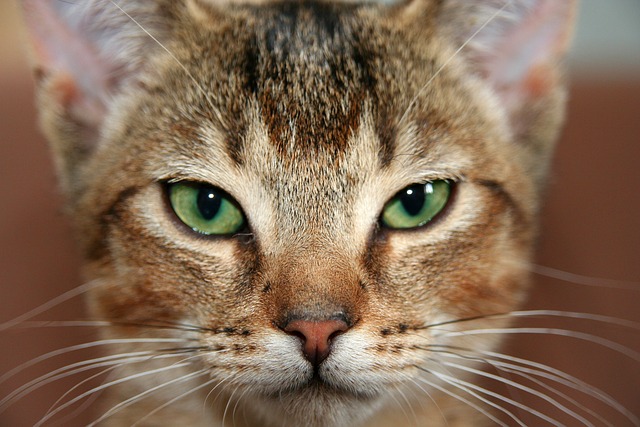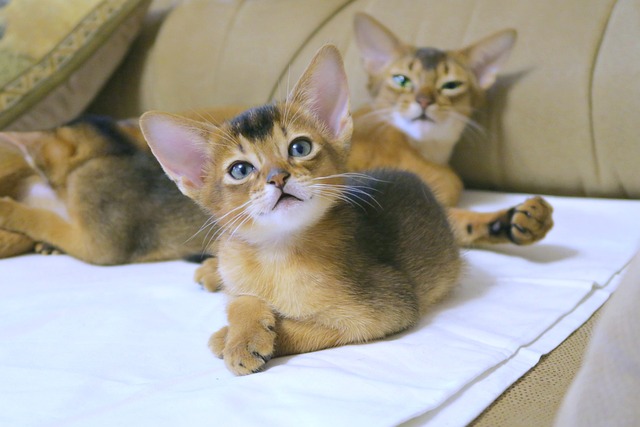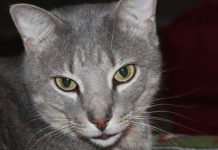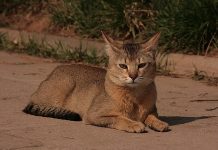History and Origins of the Abyssinian Cat Breed

The Abyssinian cat is an ancient and elegant breed known for its distinctive appearance and lively personality. While the exact origins of the Abyssinian are shrouded in mystery, historical evidence suggests that this breed has ancient roots dating back thousands of years. Here’s a brief overview of the history and origins of the Abyssinian cat breed:
- Ancient Origins: The Abyssinian’s ancestry can be traced back to ancient Egypt, where cats resembling the modern Abyssinian were depicted in Egyptian art and artifacts. Some believe that the Abyssinian cat is directly descended from the sacred cats worshipped by the ancient Egyptians.
- Legend and Myth: One popular theory suggests that the Abyssinian cat is the direct descendant of cats that lived in ancient Egypt and were brought to Abyssinia (modern-day Ethiopia) by British soldiers during the Abyssinian War in the 1860s. This theory has contributed to the breed’s name.
- 19th Century Development: The modern Abyssinian breed as we know it today began to take shape in Britain during the late 19th century. Abyssinian-like cats were imported from North Africa and became popular among cat enthusiasts.
- Early Breeding Efforts: Early breeders worked to refine the Abyssinian breed by selectively breeding cats with desirable traits, including the distinctive “ticked” coat pattern, almond-shaped eyes, and elegant physique.
- Recognition and Popularity: The Abyssinian breed gained recognition and popularity in the early 20th century, and breed standards were established to define the breed’s characteristics. The breed was officially recognized by cat associations in Europe and North America.
Today, the Abyssinian cat is celebrated for its beauty, intelligence, and affectionate nature. While its exact origins remain speculative, the Abyssinian’s allure as an ancient and exotic breed continues to captivate cat lovers around the world.
Physical Characteristics and Appearance of Abyssinian Cats
The Abyssinian cat is known for its sleek, muscular build and striking appearance. This breed is characterized by its unique coat pattern, expressive almond-shaped eyes, and elegant demeanor. Here are the key physical characteristics and appearance traits of Abyssinian cats:
- Coat: The Abyssinian’s most distinctive feature is its coat, which is short, dense, and has a distinctive “ticked” pattern. The ticked coat consists of multiple bands of color on each hair, giving the coat a shimmering and agouti appearance. The coat colors include ruddy (usual), red, blue, and fawn.
- Body: Abyssinians have a medium-sized, muscular body with a graceful and athletic build. They are agile and well-proportioned, with long legs and a balanced physique.
- Head: The Abyssinian’s head is wedge-shaped, with a slightly rounded skull and pronounced muzzle. They have large, expressive almond-shaped eyes that are typically gold, amber, or green in color.
- Ears: Abyssinians have moderately large ears that are alert and upright. The ears are set slightly apart and contribute to the breed’s alert and attentive expression.
- Tail: The tail of an Abyssinian is long, tapering, and in proportion to the body. It is carried gracefully and adds to the breed’s overall elegance.
- Expression: Abyssinians are known for their intelligent and alert expression. They have a curious and inquisitive demeanor, often observing their surroundings with keen interest.
- Musculature: Despite their sleek appearance, Abyssinians are muscular and athletic cats. They are agile climbers and enjoy active play.
- Temperament: Abyssinians are lively, affectionate, and highly social cats. They form strong bonds with their owners and enjoy interactive play and mental stimulation.
Overall, the Abyssinian cat is a captivating breed known for its stunning coat, elegant physique, and engaging personality. Their unique appearance and friendly disposition make them wonderful companions for households seeking an active and affectionate feline friend.
Abyssinian Cat Temperament and Personality Traits
Abyssinian cats are known for their lively, intelligent, and affectionate nature. They are energetic and curious cats that thrive on interaction with their owners. Here are the key temperament and personality traits of Abyssinian cats:
- Active and Playful: Abyssinians are highly active and playful cats. They enjoy interactive games, climbing, and exploring their environment. Providing them with toys and engaging activities is essential to keep them mentally and physically stimulated.
- Curious and Inquisitive: Abyssinians are curious by nature and like to investigate their surroundings. They are often found perched on high vantage points, observing their domain with keen interest.
- Intelligent and Problem-Solving: Abyssinians are smart cats that enjoy mental challenges. They can learn tricks and enjoy puzzle toys that stimulate their minds.
- Affectionate and Social: Abyssinians form strong bonds with their owners and enjoy being involved in household activities. They are affectionate cats that like to cuddle and seek attention from their family members.
- Good with Children and Other Pets: Abyssinians are generally good-natured and get along well with children and other pets. They are social cats that appreciate companionship.
- Vocal and Expressive: Abyssinians are known for their soft, melodious voice and may use it to communicate with their owners. They enjoy “talking” and may engage in conversations with their humans.
- Athletic and Agile: Abyssinians have a muscular build and are agile climbers. They excel in activities that require speed and agility.
- Independent but People-Oriented: While Abyssinians are independent cats, they are also people-oriented and enjoy spending time with their families. They may follow their owners around the house and participate in daily activities.
- Adaptable: Abyssinians are adaptable cats that can thrive in various living situations, including apartments. However, they benefit from having ample space to explore and play.
- Emotional Sensitivity: Abyssinians are sensitive to their owner’s moods and emotions. They are intuitive cats that can provide emotional support and companionship.
Overall, Abyssinians are spirited and affectionate companions that bring joy and energy to their households. They form strong bonds with their owners and thrive in environments where they receive love, attention, and mental stimulation.
Care and Grooming Needs for Abyssinian Cats
Abyssinians have short, dense coats that require minimal grooming compared to long-haired breeds. However, they still benefit from regular care and attention to keep them healthy and comfortable. Here are important care and grooming tips for Abyssinian cats:
- Brushing: Despite their short coat, Abyssinians benefit from weekly brushing to remove loose hair and distribute natural oils. Use a soft bristle brush or grooming glove to keep their coat shiny and healthy.
- Nail Trimming: Trim your Abyssinian’s nails regularly to prevent them from becoming too long and causing discomfort. Use cat-specific nail clippers and be gentle during the trimming process.
- Ear Cleaning: Check your Abyssinian’s ears regularly for dirt, wax buildup, or signs of infection. Use a vet-approved ear cleaner and cotton ball to gently clean the outer ear, avoiding the ear canal.
- Dental Care: Maintain your Abyssinian’s oral health by brushing their teeth regularly with a cat-specific toothbrush and toothpaste. Dental hygiene is important for preventing gum disease and tooth decay.
- Nutritious Diet: Feed your Abyssinian a balanced and high-quality cat food that meets their nutritional needs. Provide fresh water at all times and monitor their food intake to maintain a healthy weight.
- Regular Veterinary Check-ups: Schedule routine veterinary visits for your Abyssinian cat to monitor their health, administer vaccinations, and address any medical concerns promptly.
- Environmental Enrichment: Keep your Abyssinian mentally stimulated with interactive toys, climbing structures, and puzzle feeders. Provide opportunities for play and exploration to prevent boredom.
- Attention and Affection: Spend quality time with your Abyssinian cat, engaging in interactive play and providing affectionate interactions. They thrive on companionship and enjoy bonding with their owners.
By providing attentive care, regular grooming, and plenty of love and attention, you can ensure that your Abyssinian cat remains healthy, happy, and cherished as a beloved member of your family. Their playful and affectionate nature makes them wonderful companions for households seeking an active and engaging feline friend.
Health Considerations and Common Issues in Abyssinian Cats
Abyssinian cats are generally healthy and resilient, but like all breeds, they may be prone to certain health conditions. Understanding common health issues and proactive care can help ensure the well-being of your Abyssinian cat. Here are some health considerations and common issues to be aware of:
- Periodontal Disease: Abyssinians are susceptible to dental issues such as periodontal disease and gingivitis. Regular dental care, including tooth brushing and professional cleanings, is essential to maintain oral health.
- Renal Amyloidosis: Abyssinians are predisposed to a hereditary condition called renal amyloidosis, which affects the kidneys. Regular veterinary check-ups and kidney function tests can help monitor for early signs of kidney disease.
- Pyruvate Kinase Deficiency: Some Abyssinians may inherit a genetic disorder called pyruvate kinase deficiency (PKD), which affects red blood cell metabolism. Symptoms include lethargy, pale gums, and jaundice. Genetic testing can identify carriers and affected cats.
- Hyperesthesia Syndrome: Abyssinians may be prone to hyperesthesia syndrome, a neurological condition characterized by skin sensitivity, tail-chasing, and erratic behavior. Management may include environmental enrichment and veterinary guidance.
- Progressive Retinal Atrophy (PRA): PRA is an inherited eye disorder that can cause vision loss in Abyssinian cats. Regular eye examinations can help detect early signs of PRA.
- Allergies: Some Abyssinians may develop allergies to environmental factors, food ingredients, or grooming products. Monitor for signs of skin irritation, itching, or respiratory symptoms, and consult your veterinarian if allergies are suspected.
- Obesity: Abyssinians can gain weight if overfed or not provided with enough exercise. Maintain a balanced diet and encourage regular play and activity to prevent obesity.
- Urinary Tract Issues: Like many cats, Abyssinians may be prone to urinary tract problems such as urinary crystals or blockages. Ensure your cat stays hydrated and provide a diet that supports urinary health.
- Heart Disease: Hypertrophic cardiomyopathy (HCM) is a common heart condition in cats, including Abyssinians. Regular cardiac screenings and monitoring are recommended, especially in older cats.
Regular veterinary check-ups, preventive care, and a healthy lifestyle can help minimize the risk of health issues in Abyssinian cats. Monitor your cat’s behavior and appearance for any changes and seek prompt veterinary attention if you have concerns about their health.
Living with an Abyssinian Cat: Suitable Environments and Lifestyle Considerations

Creating a suitable living environment and adapting your lifestyle to accommodate the energetic and social nature of Abyssinian cats is key to their well-being and happiness. Here are considerations for living with an Abyssinian cat:
- Indoor Environment: Abyssinians are active cats that benefit from indoor living to protect them from outdoor hazards and risks. Ensure your home is safe, stimulating, and free from potential dangers.
- Interactive Play: Abyssinians thrive on interactive play and mental stimulation. Provide toys, climbing structures, and puzzle feeders to keep them engaged and entertained.
- Social Interaction: Abyssinians are social cats that enjoy companionship and interaction with their owners. Spend quality time playing, cuddling, and engaging with your Abyssinian cat daily.
- Environmental Enrichment: Create an enriching environment with opportunities for climbing, exploring, and observing their surroundings. Consider cat trees, window perches, and interactive toys to keep your Abyssinian stimulated.
- Regular Exercise: Abyssinians are active cats that benefit from regular exercise. Engage in interactive play sessions and provide opportunities for physical activity to keep them healthy and prevent obesity.
- Nutritious Diet: Feed your Abyssinian a balanced and high-quality diet that meets their nutritional needs. Provide fresh water at all times and monitor portion sizes to maintain a healthy weight.
- Routine Veterinary Care: Schedule regular veterinary check-ups and vaccinations for your Abyssinian cat to monitor their health and detect any potential issues early.
- Attention and Affection: Abyssinians thrive on attention and affection from their owners. Make time for daily interactions, cuddling, and playtime to strengthen your bond.
By creating a stimulating and nurturing environment and providing attentive care, you can ensure that your Abyssinian cat lives a happy, healthy, and fulfilling life as a cherished member of your family. Their playful and affectionate nature makes them wonderful companions for households seeking an active and engaging feline friend.
Abyssinian Cat Variations and Breeding Practices
The Abyssinian cat breed is known for its distinct coat pattern and striking appearance. While the breed standard primarily recognizes the classic “usual” or ruddy coat color, variations in coat color and pattern can occur due to genetics and selective breeding practices. Here’s an overview of Abyssinian cat variations and responsible breeding practices:
Abyssinian Cat Variations:
- Usual (Ruddy): The classic Abyssinian coat color is referred to as “usual” or ruddy. This color is warm reddish-brown with ticking that gives the coat a shimmering appearance. The undercoat is a lighter shade, creating a distinctive agouti pattern.
- Sorrel (Red): Sorrel Abyssinians have a warm reddish coat with dark ticking. The overall appearance is similar to the usual Abyssinian but with a more intense red hue.
- Blue: Blue Abyssinians have a soft bluish-gray coat with darker blue ticking. The overall effect is a cool-toned appearance that is striking and unique.
- Fawn: Fawn Abyssinians have a lighter coat color resembling warm beige or cream, with darker ticking that creates a subtle contrast.
- Chocolate: Chocolate Abyssinians have a rich brown coat with chocolate-brown ticking. This color variation is less common but highly sought after by enthusiasts.
- Lilac: Lilac Abyssinians have a pale lavender-gray coat with lilac ticking. This color variation is rare but considered visually striking.
Breeding Practices for Abyssinian Cats:
Responsible breeders adhere to strict standards and practices to preserve the unique characteristics of the Abyssinian breed while maintaining overall health and genetic diversity. Here are key aspects of Abyssinian cat breeding practices:
- Selective Pairing: Breeders carefully select parent cats with desirable traits, including coat color, pattern, temperament, and conformation. They aim to produce kittens that meet breed standards and exhibit the distinctive Abyssinian look.
- Genetic Testing: Responsible breeders perform genetic testing to screen for hereditary health conditions, such as pyruvate kinase deficiency (PKD) and progressive retinal atrophy (PRA). This helps prevent passing on genetic disorders to future generations.
- Health Monitoring: Breeders prioritize the health and well-being of their breeding cats, providing regular veterinary care, vaccinations, and screenings for common health issues. Cats with known health issues are not used for breeding.
- Ethical Practices: Reputable breeders adhere to ethical breeding standards, ensuring that their cats receive proper care, socialization, and attention. They prioritize the welfare of their cats and kittens throughout the breeding process.
- Pedigree Documentation: Abyssinian kittens from responsible breeders are typically registered with recognized cat associations, such as The International Cat Association (TICA) or the Cat Fanciers’ Association (CFA). Pedigree documentation ensures lineage authenticity and adherence to breed standards.
- Education and Support: Responsible breeders educate prospective owners about the Abyssinian breed, including care requirements, temperament, and potential health considerations. They offer ongoing support and guidance to new owners.
By following responsible breeding practices, Abyssinian breeders contribute to the preservation and improvement of the breed while ensuring the health and well-being of their cats. Prospective Abyssinian cat owners should seek reputable breeders who prioritize health, temperament, and adherence to breed standards in their breeding programs. This helps promote the longevity and quality of the Abyssinian breed for future generations.
50 Best Names with Meanings for Abyssinian Cats
Naming your Abyssinian cat can be a fun and meaningful process, especially considering their striking appearance and unique personality. Here are 50 great names with meanings for Abyssinian cats to inspire you:
- Zuri – Swahili for “beautiful”
- Saber – Symbolizing strength and agility
- Luna – Latin for “moon,” reflecting a mystical quality
- Cleo – Short for Cleopatra, symbolizing elegance
- Simba – Swahili for “lion,” reflecting bravery
- Astra – Latin for “star,” representing brightness
- Koa – Hawaiian for “brave”
- Jasper – Named after the gemstone, symbolizing elegance
- Nala – Swahili for “successful” or “queen”
- Cairo – Inspired by the capital of Egypt
- Ember – Representing warmth and intensity
- Sahara – Named after the desert, symbolizing strength
- Milo – Derived from Latin, meaning “soldier”
- Cassia – Greek for “cinnamon,” reflecting the coat color
- Phoenix – Symbolizing rebirth and resilience
- Azizi – Swahili for “precious”
- Kali – Sanskrit for “fierce”
- Orion – Named after the constellation
- Athena – Greek goddess of wisdom and courage
- Copper – Reflecting the warm color tones
- Zephyr – Greek for “west wind,” representing freedom
- Zara – Arabic for “princess”
- Harley – Reflecting a strong and independent spirit
- Indigo – Symbolizing mystery and depth
- Nyx – Greek goddess of the night
- Leo – Latin for “lion,” reflecting bravery
- Maui – Named after the Hawaiian island
- Electra – Greek for “sparkling” or “shining”
- Kai – Hawaiian for “sea”
- Amara – Greek for “eternal,” representing timeless beauty
- Apollo – Greek god of music and light
- Sasha – Russian for “defender of mankind”
- Cyrus – Persian name meaning “sun”
- Nova – Latin for “new,” symbolizing brightness
- Juno – Roman goddess of marriage and family
- Oscar – Meaning “divine spear,” symbolizing strength
- Lyra – Named after the constellation
- Titan – Symbolizing strength and power
- Mira – Latin for “wonderful”
- Crimson – Reflecting the rich color tones
- Zelda – Germanic name meaning “gray battle”
- Dante – Italian for “enduring” or “steadfast”
- Layla – Arabic for “night,” symbolizing mystery
- Rio – Named after the river, representing vitality
- Artemis – Greek goddess of the hunt
- Saffron – Reflecting the warm orange tones
- Titan – Symbolizing strength and power
- Echo – Greek mythological nymph known for her captivating voice
- Kairos – Greek for “opportune moment”
- Nimbus – Latin for “cloud,” symbolizing softness and elegance
Choose a name that resonates with your Abyssinian cat’s personality, appearance, or your personal preferences. Whether you prefer a name inspired by nature, mythology, or cultural significance, your Abyssinian cat will appreciate the love and attention you give them with their new name!

In summary, the Abyssinian cat is a captivating and energetic breed known for its sleek appearance, playful nature, and affectionate personality. Originating from Ethiopia (formerly Abyssinia), these cats have become popular worldwide for their ticked coat, almond-shaped eyes, and lithe build. Abyssinians are intelligent and curious cats that enjoy exploring their surroundings and interacting with their human companions. They are social and outgoing, often forming strong bonds with their families. Abyssinians thrive on mental and physical stimulation, making interactive playtime essential for their well-being. With their active and engaging demeanor, Abyssinian cats bring joy and companionship to any household fortunate enough to have them.






























